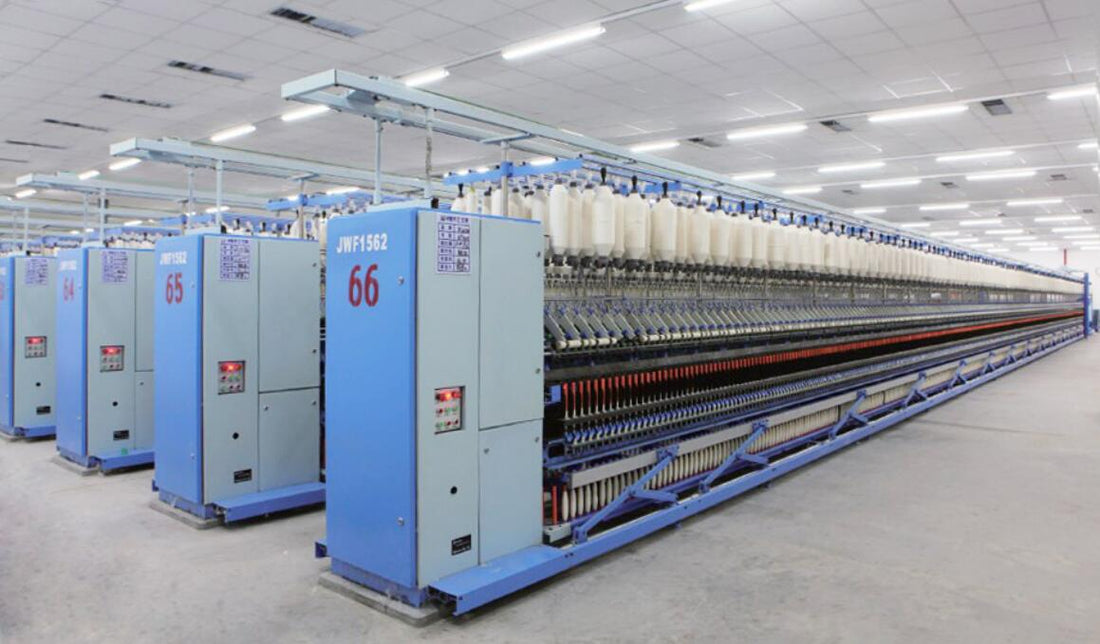
Application of Magnetically Assisted Synchronous Reluctance Motors (MASynRM) in Ring Spinning Machines
Share
The Magnetically Assisted Synchronous Reluctance Motor (MASynRM) has significant potential for application in the ring spinning machine (Ring Spinning Machine) in the textile industry, particularly due to its high efficiency, energy-saving capabilities, and adjustable speed control advantages. The ring spinning machine is a crucial piece of equipment in textile production, primarily used for transforming fibers into yarn through processes such as drafting, twisting, and winding. The choice of the motor drive system is critical to the performance and efficiency of the machine.
Advantages of Magnetically Assisted Synchronous Reluctance Motors in Ring Spinning Machines
High Efficiency and Energy Saving:
The MASynRM combines the benefits of synchronous reluctance motors (SynRM) and permanent magnet motors (PM), offering high efficiency, particularly under conditions with significant load variations. Through proper control strategies, it can reduce energy consumption and help enterprises lower operating costs in ring spinning machines.
Compared to traditional induction motors (IM), MASynRM offers better efficiency, especially at low speeds and high torque, making it well-suited for the needs of textile machinery.
Precise Speed and Torque Control:
Ring spinning machines require precise control of speed and torque to ensure yarn quality and production efficiency. MASynRM can provide accurate speed regulation via advanced control systems, ensuring stable operation throughout the spinning process.
MASynRM typically employs vector control (Vector Control) or direct torque control (DTC), both of which provide precise control, ensuring stable speed and torque during the entire spinning process.
Brushless Design, Reduced Maintenance Costs:
Compared to traditional brushed motors, MASynRM has a brushless design, eliminating the need to replace worn components such as brushes or slip rings. For high-load equipment like ring spinning machines, this reduces maintenance frequency and costs, enhancing system reliability.
With no mechanical friction, the motor experiences less wear and tear, leading to a longer lifespan and lower long-term maintenance and part replacement costs.
Low Vibration and Noise:
The ring spinning machine requires smooth operation to avoid uneven yarn production. MASynRM generates lower vibrations and noise due to its design, contributing to smoother machine operation and reducing environmental noise pollution, thus improving operator comfort.
Heat Effects and Cooling Performance:
Since MASynRM does not use permanent magnets, it has lower thermal effects and can maintain lower temperatures during extended high-load operations. Compared to traditional induction motors, MASynRM can dissipate heat more effectively and maintain stable performance under heavy load conditions, further enhancing the machine's efficiency and stability.
Application Cases and Market Outlook
Domestic and International Cases:
Leading textile machinery manufacturers have already begun incorporating MASynRM into their ring spinning machines to improve product performance and energy efficiency. For instance, high-end spinning machine models from companies like Saurer (Switzerland) and Lindauer DORNIER (Germany) have adopted this motor technology to meet the growing demand for energy-saving and intelligent control in the textile industry.
MASynRM is increasingly used in some high-end textile machinery products, driven by the need for greater energy efficiency, precision, and flexibility in production.
Market Outlook:
As the global textile industry continues to demand smart, automated, energy-efficient technologies, MASynRM has significant potential for broader application. In the context of Industry 4.0, ring spinning machines are evolving toward smart, digital, and flexible manufacturing. MASynRM, with its high efficiency, reliability, and environmental benefits, is likely to become a key technology for future textile machinery.
Challenges and Considerations
Technology Maturity:
Despite its numerous advantages, MASynRM faces technical challenges in real-world applications, such as the development of precise control algorithms, motor drive compatibility, and system integration. Ring spinning machines that employ this motor require advanced control technologies and drive systems to fully realize the motor’s potential.
Cost Issues:
MASynRM is more expensive compared to traditional induction motors. Although it offers significant energy-saving benefits during operation, its higher initial investment cost may increase the purchasing price of spinning machines, which could be a barrier for some textile enterprises, particularly those with tight budgets.
Conclusion
The application of Magnetically Assisted Synchronous Reluctance Motors (MASynRM) in ring spinning machines can significantly improve the energy efficiency, precision control, and stability of textile equipment, meeting the increasing demand for energy-saving, smart, and high-performance solutions in the textile industry. Despite some technical and cost challenges, as technology advances and applications become more widespread, MASynRM is poised to play a key role in driving the future development of textile machinery, particularly as the industry moves toward greater automation and sustainability.
